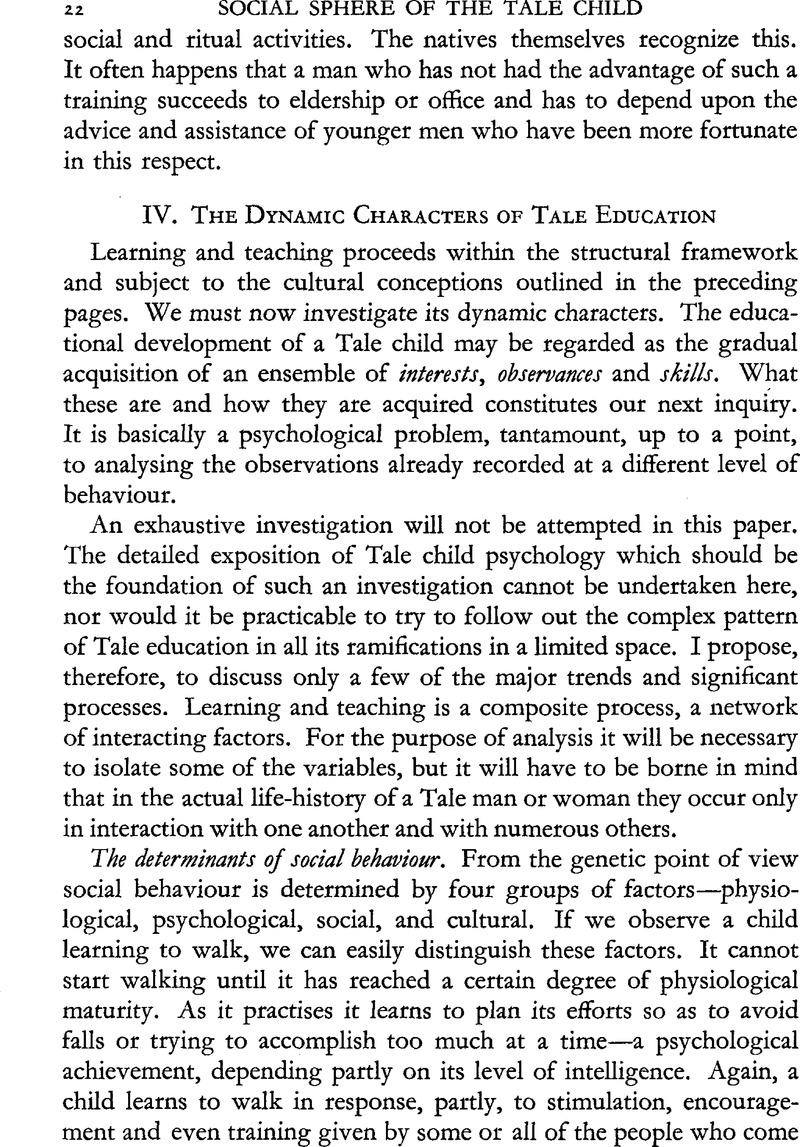No CrossRef data available.
Article contents
IV. The Dynamic Characters of Tale Education
Published online by Cambridge University Press: 21 August 2012
Abstract

- Type
- Social and Psychological Aspects of Education in Taleland
- Information
- Africa , Volume 11 , Issue S4: Social and Psychological Aspects of Education in Taleland , 1938 , pp. 22 - 44
- Copyright
- Copyright © International African Institute 1938
References
page 26 note 1 The example is intended to illustrate how the expectation of normal behaviour acts but, of course, other factors are also involved in the Tale child's acquisition of clean habits. These habits are learnt gradually, not all at once. Before it can walk or talk, its mother or an older child sometimes takes it outside when it shows signs of wishing to defecate. By the time it is expected to be clean it is being drawn into the play-activities of slightly older children, most of which take place out of doors. The need to adapt itself to the habits and standards of its older playmates is a strong stimulus to the child to learn not only bowel and bladder control but also the rules of etiquette. As the Tallensi have no special sanitary arrangements, but excrete in the open anywhere near the homestead, taking care only to keep a little way from the paths and from any people who may be about, it is easy for a child to learn the adult convention from the example of older children and adults. Clean habits, like other skills, are learnt as organic responses (see below, p. 10). I shall refer to this matter again, in another context, in a later section.
page 30 note 1 See N. Isaacs in Intellectual Growth of Young Children.
page 33 note 1 See M. and S. L. Fortes, ‘Food in the Domestic Economy of the Tallensi’, loc. cit., for a more detailed description of this.
page 33 note 2 The argument of this section owes much to the stimulus of Durkheim's L'Éducation morale.
page 34 note 1 The connexion between one particular aspect of Tale morality, their notion of incest, and the background of kinship has been discussed in my paper on ‘Kinship, Incest and Exogamy’, loc. cit.
page 36 note 1 I have not attempted to track the Tale attitudes towards authority and justice to their roots in infant psychology, as would be necessary for an exhaustive analysis. Some of the phenomena which should be observed in this connexion are not accessible to study by the behaviouristic methods of the field worker. But it may be worth mentioning that one can readily observe the constraint and force which, at some times, the affection and indulgence which, at others, are expressed in the way parents treat their infant children. From the day of its birth an infant is subjected to the agonizing ordeal of a daily bath in steaming medicated water which is so hot that it becomes rigid with pain on the first douche. One sees infants of a few days to about 12 months old arbitrarily held down on their mother's laps while medicated drinking water is forcibly poured down their throats as they struggle and splutter. A few minutes after an infant has been treated thus roughly it will be lovingly suckled, fondled, and caressed by mother or sister, or affectionately dandled by its father. A 3-year-old suddenly frightened runs to its father, or more characteristically to its mother to bury its face between her knees, clutching her thighs, or to snatch at the breast. The same 3-year-old, in afitof temper, will nag, whimper petulantly, strike its mother with its little fists. No one beats an infant for this. The mother tries to soothe it, or patiently calls some one—husband or co-wife—to come and take charge of the unruly child. This indulgence extends t o the excretory processes, and to masturbation, which is overt until puberty in boys. Until it is weaned, at about 3—when it can walk—it has very complete possession of its mother. After weaning, which is generally mild, the child becomes more detached from its mother, who now resumes regular intercourse with her husband. At this age, or even younger, children are often playfully threatened by their fathers. ‘I will slaughter you if you do so and so’, but they always seem to react with complete equanimity to this. Yet a boy of 4-5 years, suspiciously eyeing me from the security of his mother's lap, was heard to say that he was afraid I might cut off his penis. The Tale infant, in short, appears to be permitted o t gratify all its wish impulses without restraint; yet it must do so in a social world over which it has no control, in which it is a weak dependant. Here, I think, still speaking in terms of superficial psychology, is the germ of the later domination of respect for authority in the child's moral development. It seems probable, from these observations, that the deeper psychology of the process is not unlike that which has been recorded by students of our own children, such as Dr. S. Isaacs.
page 41 note 1 J. Piaget, Language and Thought of the Child.
page 42 note 1 I have taken this concept from Prof. Bartlett's, F. C.Remembering, pp. 199 ffGoogle Scholar., though its bald application here hardly does justice to the significance given to it by Prof. Bartlett, and to its value for an understanding of primitive education.


